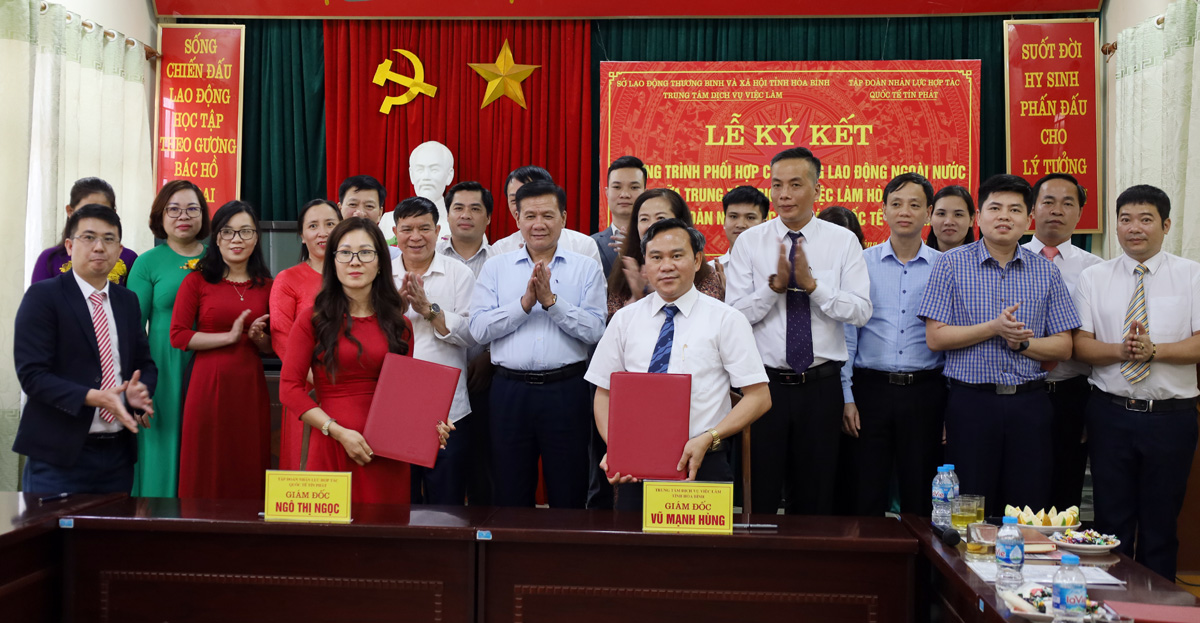
(HBO) - The Provincial Center for Job Service held a signing ceremony of the labor supply coordination with Tin Phat International Cooperation of Human Resources. The leaders of the Department of Labor, Invalids and Social Affairs, Provincial Communist Youth Union, and the Provincial Trade Union of Officials attended and witnessed the signing ceremony.
 The signing ceremony between the Provincial
Center for Job Service and Tin Phat International Cooperation of Human
Resources.
The signing ceremony between the Provincial
Center for Job Service and Tin Phat International Cooperation of Human
Resources.
Over the past time, the Center has implemented
many related programs to help employees get jobs, actively contributing to the
NTP on poverty reduction and job creation for the members of the Communist
Youth Union and the young people in the province. The province's set plan by
the end of 2021 is creating jobs for over 16,000 employees, including at least
320 employees going to work abroad.
Tin Phat International Cooperation of Human
Resources is an enterprise with full functions and reputation in recruiting and
training, which has been licensed by the Ministry of Labor, War Invalids and
Social Affairs, and by the Department of Labor, War Invalids and Social Affairs
to operate in the province. Recently, the enterprise has made great efforts to
coordinate with the Center on mobile job exchanges in the districts and the
city. Within the framework of the signing ceremony, Tin Phat International
Cooperation of Human Resources will accompany the Center in propaganda,
recruitment and labor training, trying to help many laborers in the province to
work in the working markets in Japan, Singapore, Korea, Taiwan...
The Center
has committed to preparing the best facilities and conditions, actively
cooperating with businesses, continuing to promote job training and supply of
laborers to work at home and abroad, creating confidence for the employees. At
the same time, it is hoped that the signing program and the labor - employment
issue of the province will receive more attention and support from the
appropriate branches, unions, committees, and the local authorities.
The Standing Board of the Hoa Binh provincial Party Committee has agreed in principle on a proposal by the Standing Board of the Party Committee of Hoa Binh city to gather feedback on the city’s 1:2000 zoning plan, which forms part of its broader urban development strategy.
Hoa Binh province has made notable progress in public administration reform and digital government development, with the satisfaction index among citizens and businesses reaching over 84%, according to recent government evaluations.
Thanks to great efforts by local authorities in recent times, the governance and public administration performance of Mai Chau district has been significantly improved.
In the afternoon of June 6, the Party Committee, the People's Council, the People's Committee and the Fatherland Front of Lac Son district solemnly held a meeting to celebrate the 139th anniversary of the district's founding (1886–2025) and the 79th anniversary of the establishment of the district's Party Committee (1946–2025). There was the attendance of Mr. Bui Van Thang, the Vice Chairman of the Provincial People's Council; Mr. Quach Tat Liem, the Vice Chairman of the Provincial People's Committee; Ms. Dang Bich Ngoc, the Deputy Head of the National Assembly Delegation of the province; as well as the former leaders of the province and district through various periods, who are the natives of the district.
Implementing the Politburo’s Resolution No. 57-NQ/TW on breakthroughs in science – technology, innovation, and digital transformation is a golden opportunity for the northern mountainous province of Hoa Binh to renew growth model, improve competitive edge and shorten digital gap.
Resolution 57-NQ/TW, issued by the Politburo on December 22, 2024, identifies sci-tech, innovation, and digital transformation as strategic breakthroughs to build a developed and prosperous nation. In Hoa Binh province, this spirit is not just a slogan, it’s being put into action through concrete initiatives that form a "new development triangle”: digital citizenship, digital economy, and digital administration.



 The signing ceremony between the Provincial
Center for Job Service and Tin Phat International Cooperation of Human
Resources.
The signing ceremony between the Provincial
Center for Job Service and Tin Phat International Cooperation of Human
Resources.